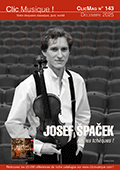|
|
|
Format : 1 CD
Durée totale : 01:14:56
Enregistrement : 03/04-25/05/2018
Lieu : Sarrebrück
Pays : Allemagne
Prise de son : Stereo
Label : Rondeau
Référence : ROP6156
EAN : 4037408061568
Code Prix : DM017A
Année d'édition : 2018
Date de sortie : 01/09/2018
Genre : Classique
|
|
 |
Alberto Hemsi (1898-1975)Coplas Sefardies, op. 22 De las altas mares
Una matica de ruda
De que lloras, blanca niña
Avrid, mi galanica
Cien donzellas van a la misa
Abaxéx abaxo, galanica gentil Coplas Sefardies, op. 34 Malaña tripa de madre
Bueno asi biva la coshegra
Tres hermanicas eran
Morenica a mi me llaman
Ay mancebo
El buen viar Coplas Sefardies, op. 41 Alevantéx vos toronja
Al ruido de una fuente
Cuando la comadre
Reina de la gracia
Vamos para la urilla
Dia de alhad Kal Nidrey, op. 12 Arba'a Shirim, op. 42 Lekhu nerannenah
Hinnakh yafah
Mi yiten
Shalom aleykhem Visions Bibliques, op. 48 Vision d'Ezéchiel
Vision d'Isaie
Vision de Cyrus Assaf Levitin, baryton
Naaman Wagner, piano
|
 
 With their recording of Alberto Hemsi’s Coplas Sefardies, Assaf Levitin (cantor at the Liberal Jewish synagogue in Hanover) and the pianist Naaman Wagner recover an almost forgotten treasure of European and Jewish cultural history — just in time for the composer’s 120th birthday in 2018. Hemsi has been understood as a passionate guardian and advocate of Sephardic folklore and its musical tradition. For years he gathered together many texts and melodies of this Jewish people which had lived in Spain until around 1500 before being dispersed throughout the Mediterranean after their expulsion from the Iberian Peninsula. Hemsi collected and notated the monodic, unaccompanied songs and added to them a virtuosic, atmospheric piano accompaniment. Assaf Levitin and Naaman Wagner hereby present the second CD of the very first complete recording of Alberto Hemsi’s Coplas Sefardies. In addition, as part of the complete recording of all piano songs, they present Hemsi's settings of liturgical and paralliturgical texts in the Hebrew and Aramaic languages: the Kal Nidrey and the two song cycles Arba'a Shirim and Visions Bibliques.
 |
| . |
 |
|
|
